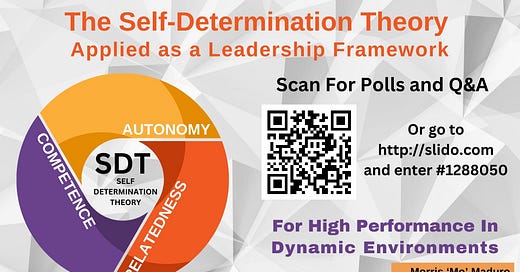Self Determination Theory
Self Determination Theory (SDT) is a comprehensive framework for understanding human motivation and personality, developed by psychologists Edward Deci and Richard Ryan. SDT posits that individuals have innate psychological needs that are essential for their growth, integrity, and well-being. These needs are:
Autonomy: The need to feel in control of one’s own behaviors and goals. When people experience autonomy, they feel that their actions are volitional and self-endorsed. Autonomy is about having a sense of choice and willingly engaging in activities.
Competence: The need to feel effective and capable in one’s activities. Competence involves mastering tasks and learning new skills. It is about having opportunities to exercise and express one’s abilities, thus feeling a sense of achievement and growth.
Relatedness: The need to feel connected to others, to care for and be cared for by others. Relatedness is about having meaningful relationships and a sense of belonging within a community. It emphasizes the importance of interpersonal connections and social support.
SDT suggests that when these three fundamental needs are met, individuals are more likely to experience intrinsic motivation—the internal drive to perform an activity for its inherent satisfaction rather than for some separable consequence. Intrinsic motivation leads to greater engagement, creativity, and well-being. Conversely, when these needs are thwarted, individuals may experience diminished motivation, engagement, and well-being.
SDT is not only applicable to individual development but also provides valuable insights into organizational behavior, educational settings, healthcare, and other areas. It underscores the importance of creating environments that support autonomy, competence, and relatedness to foster optimal functioning and growth.
Leader As Coach
Leader As Coach is a leadership approach where the leader adopts a coaching mindset and methodology to foster growth, development, and high performance within their team.
This approach emphasizes empowering team members through active listening, asking insightful questions, providing constructive feedback, and facilitating self-discovery. Leaders who act as coaches prioritize the development of their team members' skills and competencies, encourage autonomy, and build strong, trusting relationships.
They focus on unlocking potential, fostering a culture of continuous learning and improvement, and supporting their team members in achieving both their personal and professional goals. This leadership style is grounded in principles of empathy, collaboration, and empowerment, aiming to create an environment where individuals feel valued, motivated, and capable of taking initiative.
Together, the two serve as a framework which can be easily conveyed, followed and assessed. The simplicity of each enables a learner to start small and begin using the principles immediately.













Share this post